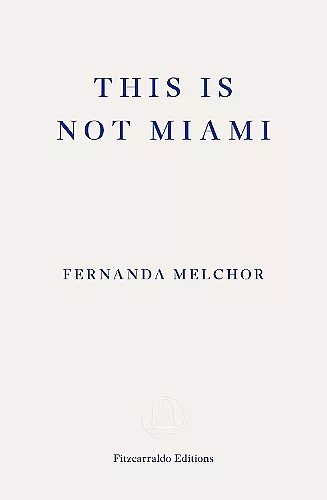This is Not Miami
True stories from the streets of Veracruz, Mexico
Fernanda Melchor author Sophie Hughes translator
Format:Paperback
Publisher:Fitzcarraldo Editions
Published:10th May '23
Should be back in stock very soon

In This Is Not Miami, Fernanda Melchor presents a gripping collection of true stories that delve into the dark corners of human existence and societal chaos.
In This Is Not Miami, Fernanda Melchor takes readers on a haunting journey through the gritty streets of Veracruz, Mexico. This collection of true stories intricately weaves together the threads of real-life events with the author's vivid imagination, creating a tapestry of human experience that is both unsettling and compelling. These crónicas reveal the complexities of the human psyche, diving deep into the lives of murderers and misfits, challenging us to confront our own prejudices and assumptions about morality and monstrosity.
The narratives within This Is Not Miami are not merely tales of violence and chaos; they are explorations of the underlying motivations that drive individuals to commit heinous acts. Melchor's ability to evoke empathy for her subjects is striking, as she invites readers to see beyond the surface and understand the circumstances that shape their lives. The stories are grounded in reality yet infused with the author's unique storytelling style, making them resonate on multiple levels.
As a continuation of Melchor's exploration of societal issues, similar to her acclaimed works Hurricane Season and Paradais, this collection underscores the fragility of human existence. Through her powerful prose, Melchor sheds light on the often-overlooked narratives that lie beneath the headlines, revealing a society teetering on the edge of chaos, where the line between victim and villain blurs.
‘The result is an absorbing, compassionately rendered portrait of a place, its people and its ills. The stories are punctuated by brief but telling allusions to the material conditions that sustain the moral degradation she describes: police corruption, social security cuts, prison overcrowding, unscrupulous building contractors. Melchor’s macabre aesthetic has shades of gothic horror, but she is a Dickensian at heart.’
— Houman Barekat, Sunday Times
‘Melchor evokes the stories of Flannery O’Connor, or, more recently, Marlon James’s A Brief History of Seven Killings. Impressive.’
― Julian Lucas, New York Times
‘Fernanda Melchor has a powerful voice, and by powerful I mean unsparing, devastating, the voice of someone who writes with rage and has the skill to pull it off.’
― Samanta Schweblin, author of Fever Dream
‘Time spent with her writing leaves no doubt: the unholy noise she creates is the work of someone who knows exactly which notes to hit.’
— Chris Power, Guardian
‘Don’t get too hung up on what exactly This Is Not Miami is, though, and you’ll find its world filthy, disquieting and compulsive.’
— Pippa Bailey, New Statesman
‘She isn’t holding a Stendhalian mirror up to Mexican society; she’s dissecting its body and its psyche at the same time, unafraid of what she might find. ... In Melchor’s world, there’s no resisting the violence, much less hating it. All a novelist can do, she seems to suggest, is take a long, unsparing look at the hell that we’ve made.’
— Juan Gabriel Vázquez, New Yorker
‘In addition to bravely presenting dark truths, Melchor writes from a good heart…Melchor makes her point (not without sorrow and gruesome humor), then gets out of the way, so that her subjects can speak.’
— William T. Vollmann, New York Times
‘Melchor isn’t inventing anything in broad strokes…She’s not playing with facts so much as how facts are delivered — oral history, first person, second person, ghost story, legend. A lesser journalist massages details to more perfectly fit a narrative. Melchor is doing something more like the opposite: playing with form to expose the lies, hypocrisies, hatreds and oversights that soften or avoid the reality of human evil. Melchor isn’t claiming to know the whole story. But what she means to say is that we should think twice before we do as well.’
— Mark Athitakis, Los Angeles Times
‘Skillfully translated by Hughes, this is a book that’s as gorgeous as it is dark, and it proves that Melchor is one of the finest writers working today. Absolutely stunning.’
—Kirkus starred review
‘Melchor resists the seductive burden of explaining the realities (or exaggerations) of such non-European regions in blistering, true-crime detail. Though based on real events, these relatos are decidedly not journalistic, and not even realist. Melchor’s prose blooms under that strange light.’
— Lisa Yin Zhang, Frieze
‘Translator Sophie Hughes has performed another heroic feat in rendering Melchor’s winding sentences into breathtakingly stylish English. These stories, packed with dismembered limbs and immolation, are not for the faint-hearted, but Melchor’s writing offers a special, twisted kind of beauty.’
— Michael Delgado, i News
‘In finding a narrative for those who are rarely given literary or any other kind of airtime, and in writing in a vernacular that acknowledges the cruelty that lurks in the language of neutral observation, Melchor writes a new kind of folklore that allows us to hear the ferocious reality of contemporary violence.’
— Jess Cotton, Jacobin
‘Seamlessly translated by Sophie Hughes from the initial Spanish, This Is Not Miami is a compelling read. However, be warned; these tales may well devour your dreaming.’
— Annie Hayter, Big Issue
‘In a country where corruption runs rampant, where the official story from the police or the government is tainted, inadequate, or missing altogether, This Is Not Miami functions as a counternarrative: Melchor presents a corrective simply by getting close to her subjects and telling their stories one by one, often in their own voices.…This Is Not Miami makes clear just how grounded the heightened drama of Hurricane Season and Paradais is. The connections between Melchor’s fiction and nonfiction go beyond the subject matter—poverty and superstition, misogyny and sexual violence—and include how a story can be corrupted as it passes from person to person.’
— Laura Adamczyk, The Nation
- Short-listed for National Book Awards (Translation) 2023
ISBN: 9781804270189
Dimensions: unknown
Weight: unknown
160 pages